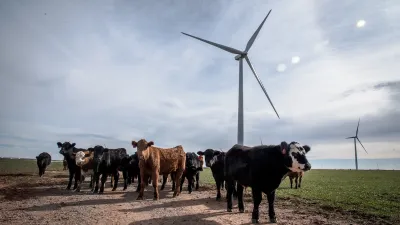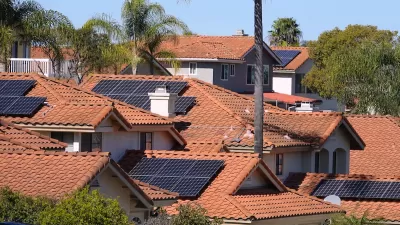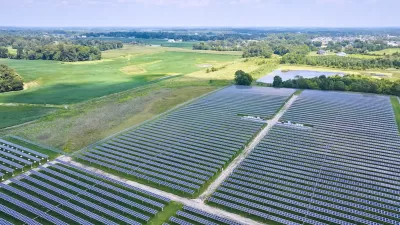A bevy of real and unfounded claims against solar farms is feeding a growing opposition movement in rural areas.

"Solar farms require huge amounts of land, and there’s a fast-growing movement, fueled by politicized social-media campaigns, to prevent solar developers from permitting new sites in rural America," reports Nichola Groom. "Solar currently makes up 3% of U.S. electricity supply and could reach 45% by 2050 to meet the Biden administration’s goals to eliminate or offset emissions by 2050, according to the Department of Energy. To get there, the U.S. solar industry needs a land area twice the size of Massachusetts, according to DOE."
Unlike the first big projects, located in remote, unpopulated areas, "tensions are rising as the sector plans bigger projects and reaches into more populated rural areas unfamiliar with solar." Now, "As solar developers propose new, often sprawling projects in places like Kansas, Maine, Texas, Virginia and elsewhere, local governments and activist groups are seeking to block them and often succeeding. They cite reasons ranging from aesthetics that would harm property values to fears about health and safety, and loss of arable land, farm culture, or wildlife habitat."
The article details the opposition groups, formed and organized primarily via Facebook, that lead efforts to stop large-scale solar projects using an array of real and false claims. While landowners are attracted by the high prices offered by solar companies, "It’s a harder sell to communities as a whole, which often see little economic upside to offset the downsides of large installations, which often create only one or two full-time jobs."
"Local pushback could delay plans by utilities to retire aging coal plants and replace them with solar projects to appease climate-conscious investors and regulators." Solar energy proponents are working to change public perception and address local concerns. "New Jersey, for instance, became a major market for solar despite the state’s dense development, primarily by putting projects on landfills or other disturbed land. And Minnesota has voluntary standards that encourage establishing pollinator-friendly vegetation at solar sites to reduce environmental opposition."
FULL STORY: Special Report: U.S. solar expansion stalled by rural land-use protests

Study: Maui’s Plan to Convert Vacation Rentals to Long-Term Housing Could Cause Nearly $1 Billion Economic Loss
The plan would reduce visitor accommodation by 25,% resulting in 1,900 jobs lost.

North Texas Transit Leaders Tout Benefits of TOD for Growing Region
At a summit focused on transit-oriented development, policymakers discussed how North Texas’ expanded light rail system can serve as a tool for economic growth.

Why Should We Subsidize Public Transportation?
Many public transit agencies face financial stress due to rising costs, declining fare revenue, and declining subsidies. Transit advocates must provide a strong business case for increasing public transit funding.

How Community Science Connects People, Parks, and Biodiversity
Community science engages people of all backgrounds in documenting local biodiversity, strengthening connections to nature, and contributing to global efforts like the City Nature Challenge to build a more inclusive and resilient future.

Alabama: Trump Terminates Settlements for Black Communities Harmed By Raw Sewage
Trump deemed the landmark civil rights agreement “illegal DEI and environmental justice policy.”

Dear Tesla Driver: “It’s not You, It’s Him.”
Amidst a booming bumper sticker industry, one writer offers solace to those asking, “Does this car make me look fascist?”
Urban Design for Planners 1: Software Tools
This six-course series explores essential urban design concepts using open source software and equips planners with the tools they need to participate fully in the urban design process.
Planning for Universal Design
Learn the tools for implementing Universal Design in planning regulations.
City of Santa Clarita
Ascent Environmental
Institute for Housing and Urban Development Studies (IHS)
City of Grandview
Harvard GSD Executive Education
Toledo-Lucas County Plan Commissions
Salt Lake City
NYU Wagner Graduate School of Public Service





























